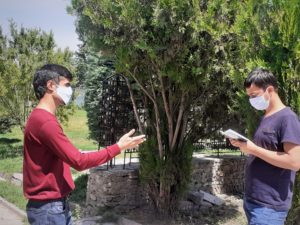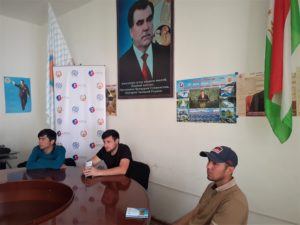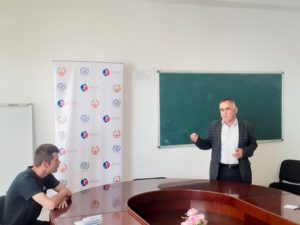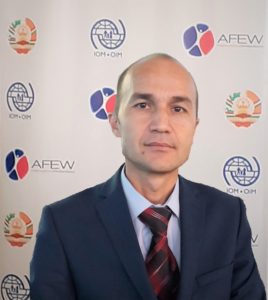In 2019, IOM Tajikistan in cooperation with AFEW International and AFEW Kyrgyzstan in the framework of Bridging the Gaps launched the project “Improving migrants’ access to HIV services in Tajikistan” to scale up the access of Tajik migrants, in particular from the key populations, to HIV services.
Kulob-based NGO Nakukor, which is IOM’s partner, became a part of this project. Nakukor has many years of experience in working with different groups of migrants. The head of this NGO, Bakhodur Khaitov, told AFEW International about safe migration, which challenges migrants face when they come to a foreign country and how Nakukor helps migrants to find the best solution to overcome existing barriers.
Bakhodur, what does the term “safe migration” mean?
Safe migration means that the migrants are protected from any risks related to their health, legal status or life at all the stages of the migration process (in the countries of origin, transit and destination). Creating conditions to enable safe migration, first of all, means advocating for the rights of migrants to have decent work and living conditions. It also means migrants have access to social and health services. Taking into account today’s global migration trend, a safe migration process is vital for migrants.
It is the task of the government to help create civilized and safe migration conditions and equip people with the required knowledge, so they can mitigate their risks of falling in the hands of human traffickers or finding themselves in other difficult situations.
What are the vulnerabilities of migrants and especially the migrants who use drugs?
Mainly, they are related to poor working and living conditions, lack of legal protection, limited access to social services, feeling of isolation, stigma and discrimination, language barrier, and cultural differences.
As for the migrants who use drugs, they face double stigma due to their use of psychoactive substances. In the general population, both in their countries of origin and countries of destination, there is a widespread opinion that drug use is not a disease but a sin and that it is not possible to re-integrate a person who uses drugs into the society. Such things as lack of substitution treatment programs in many countries, language barriers, fear of deportation and other problems contribute to the vulnerability of migrants who use drugs. Migrants do not receive the help they need to break the circle of drug use, find a job, and support a family due to social and economic challenges as well as lack of government-funded rehabilitation and reintegration programs for drug users. People who used to be participants in subscribed opioid substitution treatment programmes in their countries of origin, have to interrupt their treatment when they become labour migrants abroad. This increases their risks and often makes them go back to illegal drugs from unsupervised sources. The situation is aggravated because of the lack of prevention and support programmes for migrants in the host countries: such as needle and syringe exchange programmes, voluntary counselling and testing, legal aid, residential projects. Special attention should be paid to the issue of migrants’ referral between NGOs in the countries of origin and destination.
 What do migrants often forget about during their migration?
What do migrants often forget about during their migration?
Usually, Tajik migrants find jobs using informal networks of their acquaintances and neighbours. When they are still in their homeland, migrants often do not properly prepare themselves for going abroad. This means that they do not check the migration laws of the country of destination, they do not undergo the required medical check and often do not collect information about the organizations offering services to migrants both in their own country and abroad. As a result, when migrants face some problems in a foreign country, they do not know what to do and where to go for help.
Working with migrants within this project, we found out that many of them faced deportation or administrative expulsion for 3 to 5 years or even longer due to various reasons. As a rule, migrants are the only breadwinners in their families, while their wives, children, parents and sometimes even brothers and sisters live as one household. Currently, because of Covid-19, the situation of deported labour migrants and their family members has worsened because of the high unemployment rate in their home country. The returning migrants are desperately looking for jobs, and if they can find part-time jobs in local businesses or at local construction sites, they get very small salaries. These salaries often do not allow them to cover the basic needs of their families related to food and health.
Nakukor’s experience shows that migrants are really interested to learn more about the Russian migration laws, about the history and the culture of their country of destination. Also, they are eager to receive information about organizations and projects, that can help them with their legal, educational and health-related issues.
 Are your training sessions popular among migrants?
Are your training sessions popular among migrants?
Yes, participants with migration background are usually looking forward to our workshops and actively participate in our training sessions. The workshops organized for them demonstrates that in recent years, the labour migrants from the region of Kulob did not have enough opportunities to receive accurate information and qualified consultations on migration. It makes such people vulnerable as they have a greater risk to fall victim of human trafficking and experience difficulties accessing health services abroad. The training sessions offered within the AFEW-supported project “Improving migrants’ access to HIV services in Tajikistan” allowed migrants to meet the lawyers from the IOM Tajikistan and Nakukor NGO as well as representatives of the Tajik Ministry of Labour, Migration and Employment. During the training sessions, migrants could not only ask their questions, but also share their stories with the international organizations and governmental agencies. On top of that, participants were able to find out how laws and regulations apply in practice and learn about the services offered by different organisations both in Tajikistan and abroad. Participants were also interested in this project as it offered free access to HIV testing and free consultations with an STI treatment doctor.
It should be noted that in our training sessions we use a special approach. We use interactive training methods for adults. The project lawyers offer real life case studies, ask questions to migrants, encourage the participants to engage in the discussions, give feedback on their actions while being abroad, and answer any questions that the participants might have.
Within the project, you also implement outreach activities. What do they include?
Our outreach activities are aimed to reach migrants that have returned from a period abroad. We try to increase their awareness on safe migration and motivate them to seek HIV and STI services.
We are very happy that we were able to engage members of the key populations, including people living with HIV, to join our outreach team. We implement targeted activities for migrants based on their needs and raise their awareness on STI and HIV prevention. Thus, our focus lies on the key populations with migration experience: people who inject drugs, men who have sex with men, and sex workers. Besides, within our outreach activities beneficiaries receive referrals for free HIV testing and STI diagnostics.
It should be mentioned that until now migrants did not have access to free HIV testing. Within the AFEW-supported project, 1,000 HIV tests were procured by IOM to offer free testing services to migrants.
 Has the COVID-19 pandemic influenced your activities?
Has the COVID-19 pandemic influenced your activities?
Yes, based on the WHO recommendations to ensure 1.5-meter distance between people, starting from April we reduced the number of training participants to 8-10 people. We really hope that our trained beneficiaries will share their knowledge with other migrants following the “peer-to-peer” principle.
Recently we received information from IOM that our request on social support for the vulnerable migrants and their families was supported by the AFEW International and we will be able to distribute food packages and hygiene kits among the most vulnerable migrants and migrant’s households as well as conduct informational sessions on prevention COVID19.




